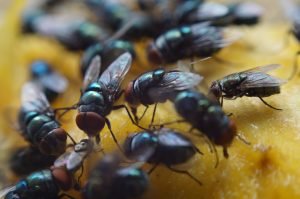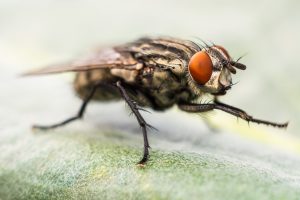
Closeup of a housefly with its reflection in a glass window
The watermelon has been sliced, corn shucked, and burgers seared to perfection. You finally sit down at the picnic table with your friends and family to enjoy your barbeque, when a massive fly lands on the potato salad. Two more show up on the hamburger buns, and before you know it, you’re swatting flies between bites.
Summer is prime time for flies to bother you, both outside and inside your home. There are thousands of species of flies in the world, but the common housefly, also known as musca domestica, is the one most likely to pester you.
In Ohio, houseflies are most prevalent spring through fall, with activity peaking during the summer months. Not only are they annoying, they also can be dangerous. The Ohio State University extension office reports flies are known to be involved in the transmission of more than 65 diseases to humans alone, including typhoid fever, dysentery, cholera, leprosy, and tuberculosis.
Flies are drawn to garbage cans, dog feces, dead animals, and open compost piles, and they use these environments for breeding grounds. They pick up bacteria in these locations and carry them to other surfaces, including humans and animals.

Housefly crawl and suck mango juice
Flies breed in warm weather, and a single female can lay up to 100 eggs after mating. It can take as little as eight hours for maggots to spawn from the eggs. With such a short window from egg to adult fly, it’s crucial to do what you can to prevent flies from breeding on your property and taking over your home.
Why do so many flies come into my house in the summer?
Flies are likely drawn into your home in search of food, or they fly in by accident. Once inside, it can be difficult for them to leave, and they most often end up buzzing up against windows and doors. In worst-case scenarios, they lay eggs in your home (including inside your walls) that quickly become more flies.
What can I do to prevent flies?
There are actions you can take to deter flies from inundating your property and taking up residence in your home. We’ve rounded up some of the best preventative measures below.
1. Mow regularly: Long grass is an ideal spot for flies to lay eggs, for both the protection and moisture it provides. Mowing weekly can help cut down on the opportunities for them to lay eggs.
2. Drain stagnant water: Flies require water to live, and their eggs need it to develop. By minimizing standing water on your property, flies will seek out other spaces. Ensure landscaping is properly sloped, regularly clean and change bird bath water, and remove any containers on your property that collect standing water.
3. Use outdoor fans: Flies struggle to fly in strong breezes. Placing oscillating fans in your outdoor living areas will deter flies from hanging around.

Fly to rub the legs
4. Light citronella candles: Flies (along with mosquitoes) hate the scent these candles emit. Light a few around your patio and deck for an extra layer of repellent.
5. Keep your property tidy: Remove dog feces from your yard, cover compost piles, and keep garbage cans clean – these are all locations flies are attracted to for breeding.
6. Maintain screens on open windows: Ensure the screens on your windows are intact and close the house up to utilize air conditioning when possible. This will provide fewer opportunities for flies to enter your home.
7. Clean your indoor spaces: Keep the kitchen and all indoor trash bins clean. If there aren’t food sources or breeding grounds available to flies, they are less likely to invade.
If you have a persistent fly problem despite taking preventative measures, you may have an infestation that requires professional intervention. A-1 Able Pest Doctors can inspect your home and property and safely treat your space to eradicate flies. To stop worrying about flies spreading bacteria and disease in your home and get back to enjoying summer, call A-1 Able Pest Doctor today at 1-800-737-8189.

Recent Comments